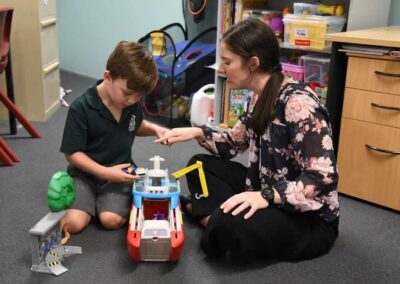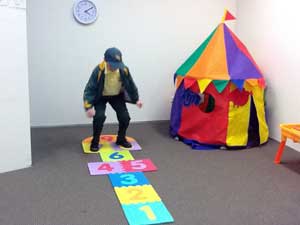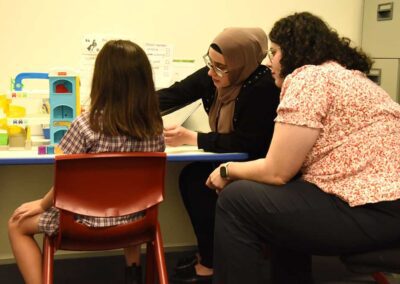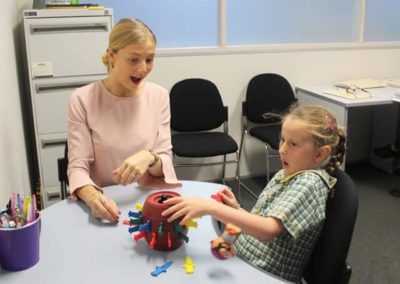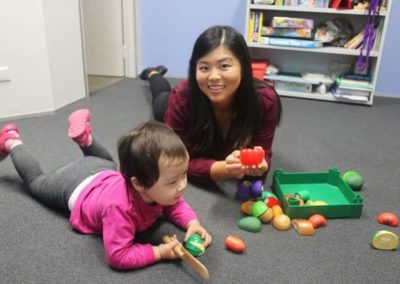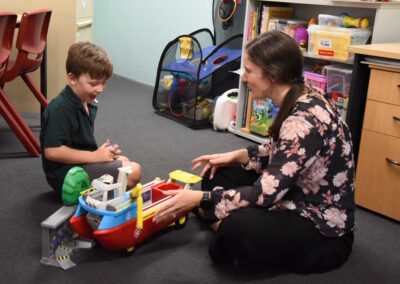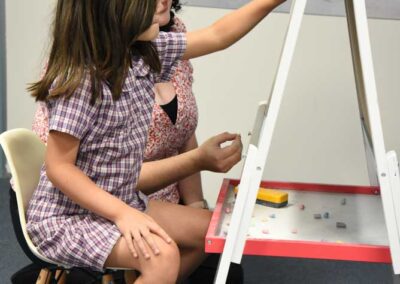A stutter is a type of dysfluency that disrupts the normal flow of speech and often presents as unintentional repetitions of speech. Children who stutter can find communicating with others difficult or frustrating and might distance themselves from social situations or be less willing to join in on conversations. Speech pathologists have a range of interventions to support a child who stutters.
Types of stuttering
There are several ways a person can stutter, all of which impact their speech fluency.
- Repeated movements: The child may repeat parts of words, a whole word, or a whole phrase. This is what most people will identify as a stutter. The number of times a word or sound is repeated can vary from person to person. g. “I-I-I-I went to the p-p-p-ark on the weekend!”
- Fixed postures and prolongations: a word may sound overly drawn out or the child may appear to be blocked from getting a certain sound out. g. “I went to the … park on the weekend!” or “I wwwwwent to the park on the weekend!”
- Superfluous behaviours: These can be verbal, where a random filler word is constantly inserted (g. “I um went um to the um park on the um weekend”). They can also be nonverbal and look like exaggerated blinking, jaw clenching, grimacing of the face or lots of head movements.
Treatment
It is important to see a speech pathologist if you suspect your child has a stutter. Early intervention for stuttering has been shown to be more successful due to a child’s brain being in a state of neuroplasticity – that is, a young child’s brain is growing and developing, and more likely to take on change than the brain of an older child or adult.
If it is determined by a speech pathologist that your child has a stutter, they will discuss your treatment options with you. A common treatment program for stuttering in young children is a 12-week intervention called the ‘Lidcombe Programme’. During this programme, you will learn strategies and techniques to improve your child’s fluency in everyday conversations at home.
My child was fine yesterday but they started stuttering this morning. What happened?
This can happen to some children. The average age for children to start stuttering, if they are going to, is around 33 months (2 years 9 months). In around half of these children, the onset of stuttering will happen quickly – almost overnight. It is important to know that you as a parent have done nothing wrong in this situation. It is a good idea to book an appointment with a speech pathologist as soon as you notice the stutter. It’s also important to be aware that stuttering fluctuates in most children, so you may notice days or even weeks when the stuttering is worse and others when it’s hardly noticeable at all. This is very typical. It can be helpful to make a note of any environmental changes that may be impacting this, e.g. an exciting event that is coming up.

My friend’s child had a stutter and they got over it on their own. Should I still seek therapy?
Yes! While recovering naturally is possible, there is no guarantee this will happen for any individual child. There can be negative impacts that stay with a child if they do not ‘outgrow’ their stutter such as social anxiety and avoidance of participation in class discussions or group projects. This can continue further into their future and effect their career.
About 2 out of 3 children will recover naturally but they will do so within a year of the stutter starting and the younger the child, the higher the success rate of therapy. With this in mind, it’s best not to take the gamble and seek treatment as soon as possible.
How can I support someone who stutters?
Whether the person stuttering is a child or someone older, you can show your support when communicating by:
- Maintaining a reasonable amount of eye-contact.

- Waiting for the person to finish.
- Showing empathy, compassion, and respect.
- Asking the person if there is a way they would like to be supported to communicate.
Things that are considered unhelpful are:
- Mocking the person with the stutter.
- Finishing their sentences for them.
- Treating them differently in a social setting or individually.
Myths
It’s important to understand that there are lots of myths around stuttering and having the correct information is vital to supporting your child.
- The parents have caused the problem.
False! While the cause of stuttering is mostly unknown, we do know that genetics plays a roll. Over 70% of cases have stuttering in their family history, with a higher occurrence in boys. There can also be the presence of a brain difference in people who stutter.
- Anxiety causes a stutter.
While anxiety can contribute to making a stutter worse, anxiety itself does not cause stuttering.
- Stuttering only begins in childhood.
The onset of stuttering can start later in life, although this is less common. For some people, this can be triggered by a brain injury or a stroke.
So, what now?
If you notice or suspect your child has a stutter, the best thing you can do is arrange to have them see a speech pathologist for an assessment. From there, you can discuss the best way to proceed to improve your child’s fluency.


